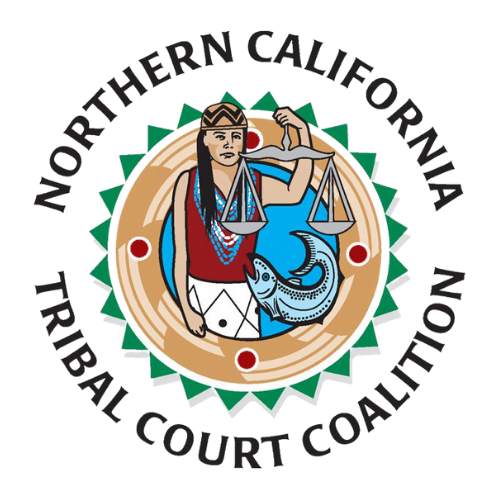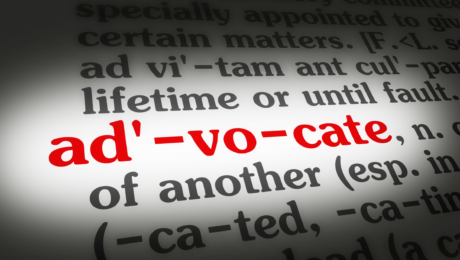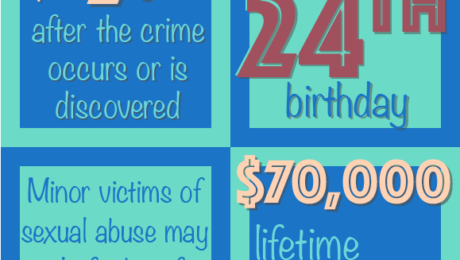July Self Care Workshop with Paula Arrowsmith-Jones
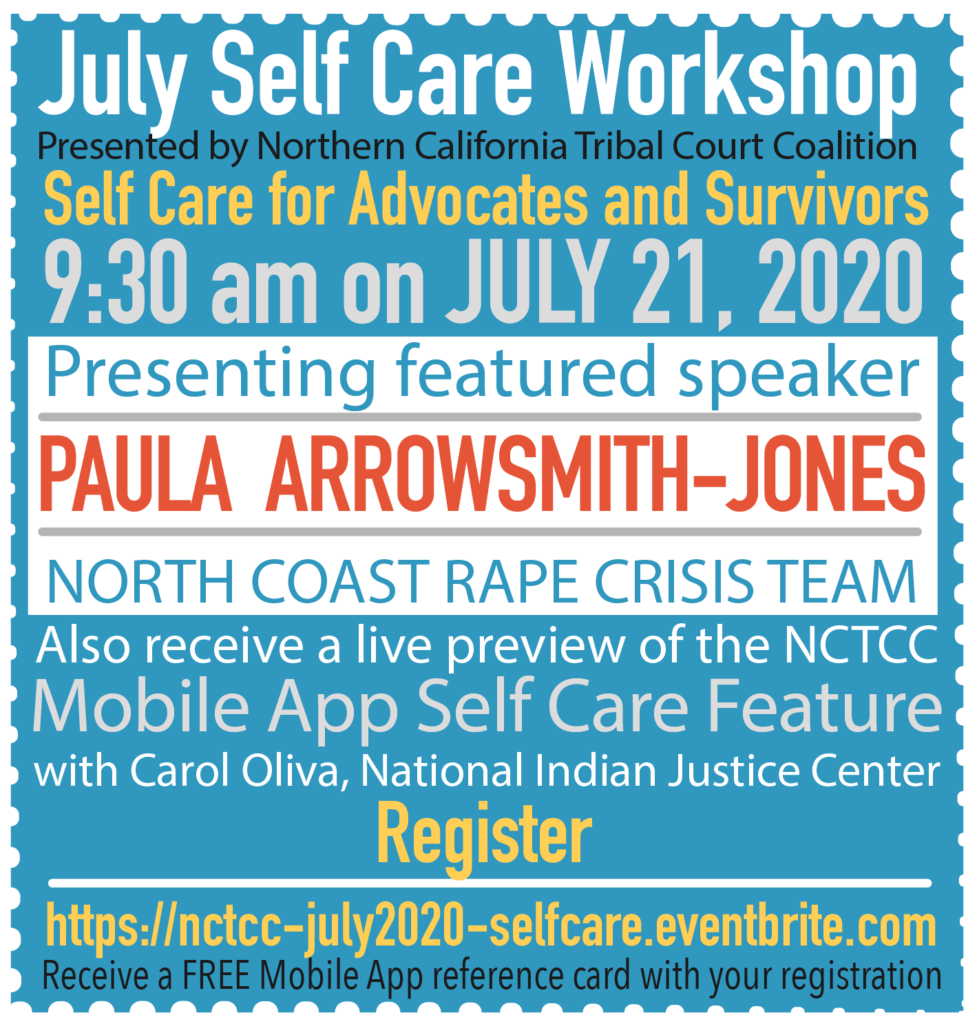
Join us on July 21 at 9:30 am for a very special self care workshop lead by Paula Arrowsmith-Jones, Director of North Coast Rape Crisis Team.
Also during the workshop, Carol Oliva (National Indian Justice Center) will provide a demonstration of the NCTCC Mobile App’s self care section.
When you register you will receive a FREE pocket reference card to assist you with quickly locating the information you need.
We look forward to you joining us!
- Published in Uncategorized
Cal VCB 101 FREE Tribal Advocate Training on May 14, 2020
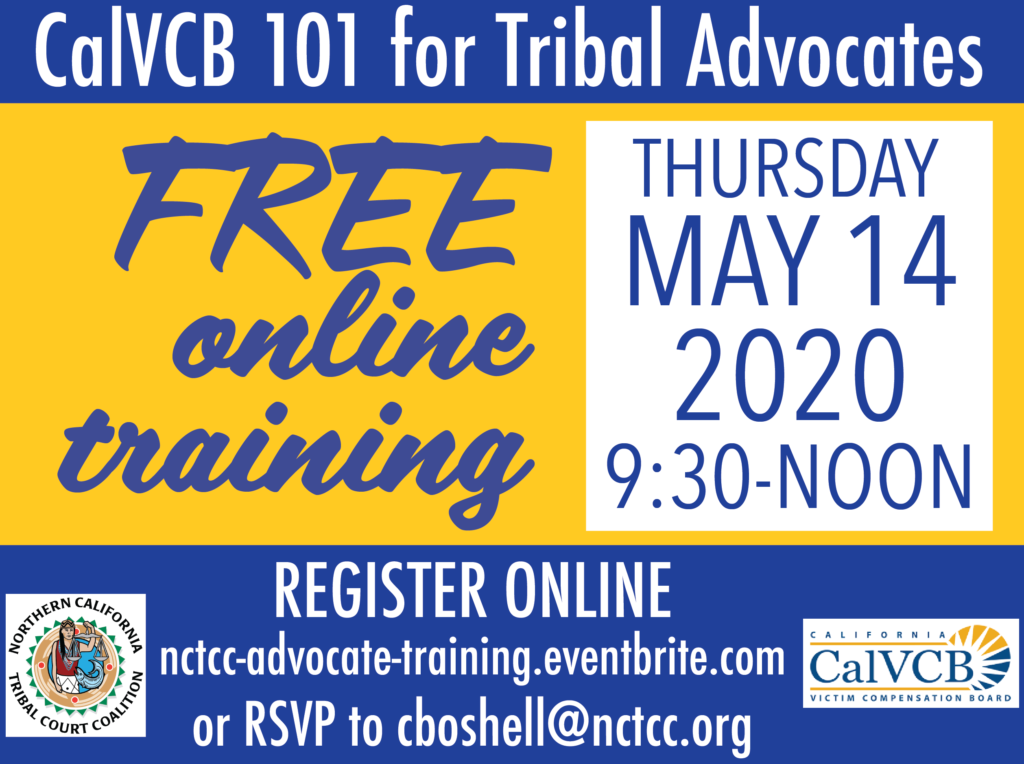
NCTCC is pleased to offer a FREE training: CalVCB 101 for Tribal Advocates. This is a special online training for tribal staff who provide services to victims of domestic violence. Victims, their family members, and representatives are also welcome to join. If you work with tribal DV victims or want to assist victims with obtaining benefits, this training will orient you to the CalVCB application process so you can increase the effectiveness of your advocacy.
We welcome you to join us for this no-cost training session with CalVCB Advocate Liaison Cindy Kaiser.
What you will learn
You will learn useful skills, including:
- How to qualify for financial benefits
- Which expenses can be reimbursed
- Strategies for navigating the process
- The responsibilities of victim representatives
How to register
You have two ways to register. You may self-register at our event website: https://nctcc-advocate-training.eventbrite.com. You may also email your RSVP to Cynthia Boshell at cboshell@nctcc.org.
How to attend
The training is fully online, so you should plan to login to the virtual classroom using a link that will be sent to your email approximately 24-48 hours prior to the event. Because we use email to send the link, when you register we ask that you provide an email that you check regularly.
If you have any difficulty with registration or have questions about the training please contact Cynthia Boshell at cboshell@nctcc.org.
This opportunity is co-hosted by Northern California Tribal Court Coalition and California Victim Compensation Board.
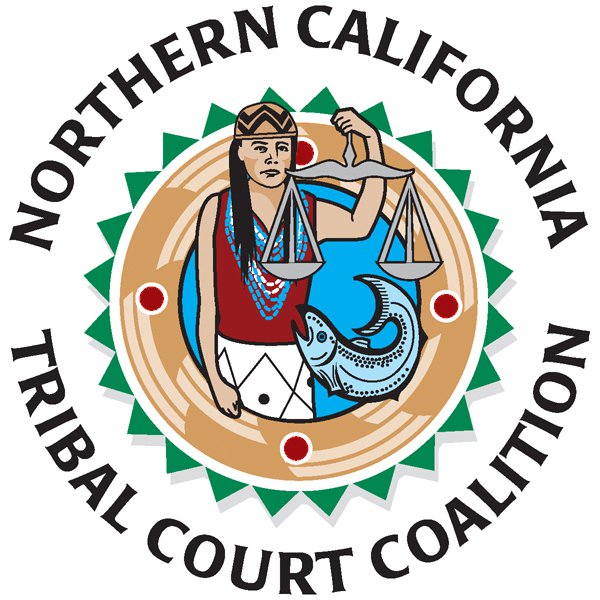
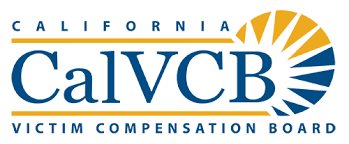
Northern California Tribal Court Coalition is here to help
We are here to help. Northern California Tribal Court Coalition’s free mobile App contains CalVCB information. Knowing how compensation works and how to receive benefits for relocation, lost income, medical expenses, and attorney fees can be empowering.
If you would like assistance with downloading or using the NCTCC App, please contact one of our Program Specialists to obtain technical assistance or arrange a training session. Contact Cynthia Boshell at cboshell@nctcc.org or Jake Swamp at jswamp@nctcc.org.
- Published in Uncategorized
New Opportunity at NCTCC
We are excited to announce that Northern California Tribal Court Coalition (NCTCC) has several openings on our DV App Advisory Committee. If you work in the area of tribal domestic violence services (examples: social work, law enforcement, tribal court, victim advocacy or community services) and would like to help shape the future of the NCTCC DV App, please consider applying for our DV App Advisory Committee.
The committee meets via phone conference for one hour each month and provides input, ideas, and feedback for DV App development. In return you have the opportunity to participate in upcoming trainings.
To apply or obtain more information please contact Sarah Caligiuri: scaligiuri at nctcc dot org.
- Published in Uncategorized
An Overview of California Victims’ Compensation
The California Victim Compensation Board (CalVCB) provides compensation for victims of violent crime, including victims of domestic violence and DUI crimes. This article is the first in a multi-part series about CalVCB for Domestic Violence (DV) advocates, DV victims, their families, and their communities. This article focuses on domestic violence victims. However, please keep in mind that benefits are available to victims of any violent crime.
Tribal victims of domestic violence often face more obstacles and greater difficulty overcoming the obstacles than non-tribal victims. CalVCB is a state agency that connects victims of violent crime with financial assistance. While financial assistance does not eliminate all the difficulties that confront DV victims, economic assistance can help minimize the obstacles that victims encounter. In this way, CalVCB is a resource that can help victims achieve positive outcomes.
PART 1: An Overview of California Victim Compensation
Victims of violent crime and their family members can apply for financial compensation for physical injury, threatened physical injury, emotional trauma, and psychological trauma. You have up to seven years after the crime was committed or discovered to apply for financial benefits. DV Advocates can help you apply for CalVCB compensation, or you can appoint a representative to assist with filing your application. Even if you think you do not need compensation right now, you should consider submitting an application so that future complications and out of pocket expenses can be compensated.
Find more information here.
Qualifying crimes
A crime is considered “violent” if it involves physical injury, threat of physical injury, psychological trauma, or emotional trauma. If you have experienced any of these types of violence, you may qualify for compensation. The following list of crimes are those that CalVCB typically covers.
- Domestic violence
- Child abuse
- Child sexual assault
- Child endangerment and abandonment
- Assault with a deadly weapon
- Battery (when there is injury or threat of injury)
- Driving under the influence
- Elder abuse
- Hate crimes
- Homicide
- Human trafficking
- Hit and run
- Vehicular manslaughter
- Murder
- Robbery
- Sexual assault
- Stalking
- Sexual battery
- Unlawful sexual intercourse (where there is injury or threat of injury)
- Terrorism
- Online harassment
- Other crimes that result in physical injury or a threat of physical injury to the victim
If you or a family member has been a victim of a crime that is not on this list but suffered physical injury, threat of physical injury, or emotional trauma as a direct result, you may qualify for benefits. If you have a question about whether a crime qualifies for compensation, you may call the CalVCB helpline at (800) 777-9229 or email at info@victims.ca.gov.
Find more information here.
Qualifying applicants
Applicants who may apply for compensation include:
- Direct victims of violent crime, including minor children.
- The family members and individuals who have or had close, intimate relationships with victims.
- Children who witness violent crime.
- Applicants must not have been involved in or committed a felony in the events leading to the crime.
Find more information here.
Qualifying expenses
CalVCB covers expenses that are directly related to the violent crime that caused your injury. Typical expenses include:
- Medical and dental treatment
- Mental health care including Telehealth
- Complementary and alternative medicine
- Funeral/burial expenses
- Medically necessary equipment
- Home or vehicle modifications
- Home security
- Relocation (moving) expenses
Find more information here.
- Income loss for direct victims and for parents/legal guardians of a minor who is hospitalized or dies
- Support loss for victims’ legal dependents
- Job retraining
- Crime scene clean-up
- Benefits for good samaritans
- Guide, signal, or service dogs
Qualifying application period
To qualify for CalVCB benefits, you must apply before the time limit has passed. Beginning in January 2020 the time limit for submitting an application has been increased from three to seven years. In some circumstances the application deadline can be extended.
For minor victims, a different time limit applies. Minor victims may apply any time before their 24th birthday. For minor victims of sexual abuse, the deadline to apply is the victim’s 28th birthday.
Find more information here.
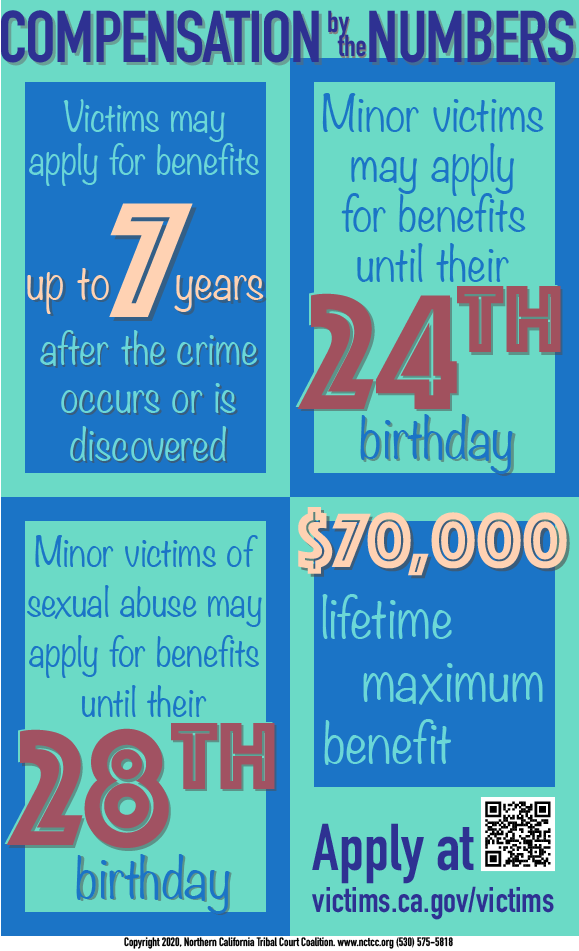
Documentation needed for your application
To document that you are a victim of a violent crime, you should expect to provide a law enforcement report or other verification. This can include a crime report, child or adult protective services report, copy of a petition for a restraining order (an order signed by a judge does not contains insufficient information; you will need to show the petition), medical and/or mental health records, affidavit from a human trafficking case worker, sexual assault examination report, Title IX campus report, battered women’s program paperwork, or a credible witness statement. Other documentation is evaluated on a case-by-case basis.
To document your expenses, you can expect to provide CalVCB with copies of crime-related bills, receipts, insurance, medical costs, mileage records, lost wages, funeral costs, relocation expenses (Lease Agreement, CalVCB Rental Verification Form, or Landlord’s W-9 Form) and any other expenses directly related to the crime.
To show other potential sources of coverage, you should expect CalVCB to ask you for insurance policy information and any other resources that can be used to pay your crime-related expenses.
Find more information about reimbursable expenses here.
Victims can apply online, however, accessing the application form prior to filing online can help you anticipate the information you will need to provide. PDF versions of the application are available in English, Spanish, or another language.
Learn more about qualifying for CalVCB benefits
CalVCB offers e-learning courses for victims of crime, family and friends of victims, the general public, service providers, helping professionals, advocates, and law enforcement. You can access training at victims.ca.gov/training/ and learn more about CalVCB here.
Assistance for tribal members
CalVCB has several ways in which it can assist tribal members who are victims of violent crime, including domestic violence.
First, tribal members are classified as California residents for eligibility determination purposes, even when the victim is a resident of a Reservation or Rancheria in California. Because tribal members are considered California residents they are eligible for compensation wherever the crime was committed. Also, for the purpose of determining whether a crime was committed in California, if a crime occurs in a California tribe’s jurisdiction, it is committed “inside California.” This eliminates the jurisdictional barrier some victims would otherwise encounter.
Second, CalVCB attempts to provide culturally sensitive services to tribal members. This means that tribal victims can receive reimbursement for a wide range of crime-related expenses including those that may be incurred to support a tribal victim’s lifeways. For instance, in addition to expenses such as medical costs, mental health treatment, relocation expenses, and loss of income CalVCB may also reimburse ceremonial costs, complementary and alternative medicine services, and in some cases can provide emergency financial assistance within 30 days.
Find information about CalVCB services for tribal communities here.
How to apply
Victims of domestic violence are eligible for CalVCB benefits because domestic violence is, by definition, a crime of violence. When a tribal member is victimized, applying for benefits to cover financial expenses can make the difference and help the healing begin.
You can apply for benefits using the CalVCB online application form or download a printable form here.
In Part 2 we will take a closer look at the CalVCB application.
Find a Victim Advocate and other resources with the NCTCC App
You can find a Victim Advocate, community organization, and other helpful resources using NCTCC’s mobile App. Download the App here.

Do you need assistance with downloading or using the NCTCC App? Reach out to us for technical assistance, to arrange a training, or ask questions about this article. Our Program Specialists are here to help. Contact Cynthia Boshell at cboshell@nctcc.org or Jake Swamp at jswamp@nctcc.org.
- Published in Uncategorized
